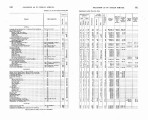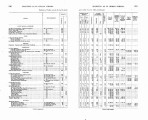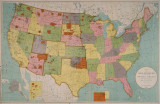| OCR Text |
Show I 2% OOMMISSIONEE OF INDIAN AFFAIRS, yet the churck. carried some measure of them to the Indian. Philan-thropists urged humanitarian principles and means upon the Govern-ment to save him from extinction. Congress early mnmed the burden of the great work, and gave material aid to the churches and charita-ble organizations who were planting mall schools in the wilderness of the West. Lewis and Clark exhibited to the wonder of the Atlantic Seaboard States the marveloas w& of the count~yp urchased from Napoleon. Their wonderful journey was a revelationiand soon where they found only the trackless wilderness and roving bands of savages, the nuclei of rich commonwealths and great cities were started. As the West developed, the reservation system became more and more a necessity from the humanitarian and police'standpoints. By gradually confining the roving bands of Indians on limited areas, vast territories were added to the public domain, and the tide of civilization poured in anirresistible wave from the East. Culture and refinement followed in the blazed trails of the pioneers, and of late years Indian reservations have been surrounded by sturdy white citizens and encom-passed by lines of railroads. Scarcely two decades ago the great majority of agencies were situ-ated in remote sections; they were distant from railroadsand telegraphs. Agents difficult of access were by necessity invested with almost auto-cratic powers of government over their red wards. Their word was law, and long intervals would elapse before proper inspection and investigation could be had. Political influence dominated and dictated the appointment of the agent. He was given a free hand in the selec-tion of his employeeb, and as a consequence the administration of Indian affairs did not reflect that credit on the Government which should have been expected. Unfortunately, the evils of the old sys-tem have remained in the minds of th general public, with the result that many at the present day believe the Indian service is a "graft." Under the old system the Indian was pampered with indiscriminate giving of rations, clothing, and annuities. His old customs were con-sidered, and even the dream of the "buffalo days" was revived in the barbarous custom of issuing live cattle and turning the Indian loose to slaughter, after the manner of the brutal days of old. Indian chil-dren were permitted to witness such scenes, greatly to their detriment. The work of the schools, as the most powerful agent in civilizing and uplifting the rising generation of Indians, was not recognized and fos-tered; in consequence the few pupils who were returned from the out-side schools were practically ostracised by their people, and no effort was put forth to hold them in civiliiation's grip. School plants were erected without proper sanitary and hygienic appliances. Many were old abandoned military forts, not adapted for such purposes. In fact conditions on reservations and the surrounding country all con. spired t.o hold the Indian in his status, or to degrade him. |












































































































































































































































